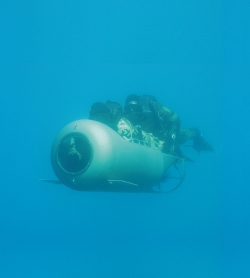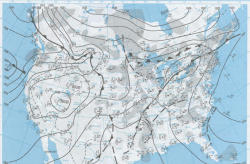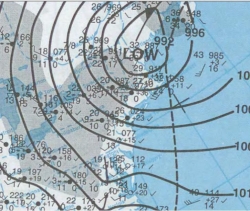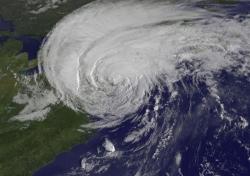Hear the wind make the roof creak and crack. Watch it tear leaves off of the trees. You know that wind has strength. But did you know it has weight, as well? Of course it does! Even though you cannot see it, the air weighs something. Think about it. Your arm is made of stuff and that stuff can push on things. Air works just the same. Just as an arm can feel heavier by pushing down on you, so can air. And it turns out that a lot about the weather is decided by how much the air is pushing.
Have you ever seen someone in a show balance a pile of plates on her head? Maybe she will balance five. Maybe even a dozen! What if I told you that you were balancing millions upon millions of things on top of your head right now? Well, you are! Kind of. All of the air above you is sitting on top of your head and all around your body, pushing down. You cannot feel it because it has been pushing since the moment you were born.
Atmospheric pressure is how much the air above pushes down on you at one point in time. The higher up you go into the atmosphere, the less air will be above and the less it will push down. Now, if you could balance all that air and twelve plates on your head . . .
Think about water. When you're floating on top of the water, there's no water above you, so it doesn't push on you at all. If you dive to the bottom of a pool, though, your ears will feel like something's pushing in on them. That pushing feeling is the weight of all the water above you. If you've ever tried to carry a giant water bottle, you know that water can get super heavy. At the bottom of the pool, you are below all of that water and it is pushing down on you. The air around you right now does the exact same thing, it just pushes a little less.

If I was trying to get to the bottom, I'd use this.
dwilson, CC0, via Wikimedia Commons
Sometimes air pushes down more than other times. You might not feel lighter in your step when this happens, but you will see another kind of change. Weather depends on how much air is pushing down.
High pressure means that air is moving down very slowly, which it usually leads to sunny skies and light winds. Think of a column of air pushing down toward the Earth. When it hits, it rushes out. It's kind of like water leaving the faucet and splashing in all directions once it hits the sink. Only it comes down a lot slower than that. The light winds are the splash. So, where does it splash to?

Looks like a high pressure zone in the west.
National Weather Service Office in Burlington, Vermont, Public domain, via Wikimedia Commons
Sometimes air will move up instead. When it gets hot, air will rise up into the sky. It might even carry some water droplets with it. Picture a sprinkler that sends a circle of water up into the air. Because it's moving up, it isn't pressing down so much.
Low pressure is when air moves up. Most of the time low pressure leads to cloudy weather. There's a better chance of rain because there's a lot of water being pushed up with the air. That's why you will hear sadness in a weather person's voice whenever they say it's a low pressure day. And a groan from anyone watching.

Just how low can weather go? News at 11:00.
NOAA Central Library, Silver Spring, Maryland, Public domain, via Wikimedia Commons
So what happens when these two meet up? What happens when hot, wet air rushes up and cool dry air rushes down? A
front is the place where low pressure and high pressures meet and can cause a storm or other kind of extreme weather. Because of all of that air moving against each other, things can get a little pushy. A cold front happens when cold air pushes the warm air out. A warm front happens when warm air is the one doing the pushing. Not only are you balancing lots of air on your head, but they are battling back and forth for room close to the Earth.

Watch out, here's a weather front coming right at you.
NASA/NOAA GOES Project, Public domain, via Wikimedia Commons
Air is really pushy. If it pushes down a lot, then we have nice weather. If it pushes up, then the weather can get cloudy and not so nice. If these two meet, they do not get along very well and try to push the other one out of the way, creating strong winds or storms. And there you are, in the middle of it. You're either balancing all of the air on top of your head, or trying to walk straight when those two get into a fight. Maybe you could tell about that someday when you're trying to get a job. They might at least be impressed that you know so much about science.
References:Kids Earth. "It's a Breeze: How Air Pressure Affects You" NASA, 2003. <
http://kids.earth.nasa.gov/archive/air_pressure/>
Weather Wiz Kids. "Weather Forecasting" Weather Wiz Kids, 2010. <
http://www.weatherwizkids.com/weather-forecasting.htm>